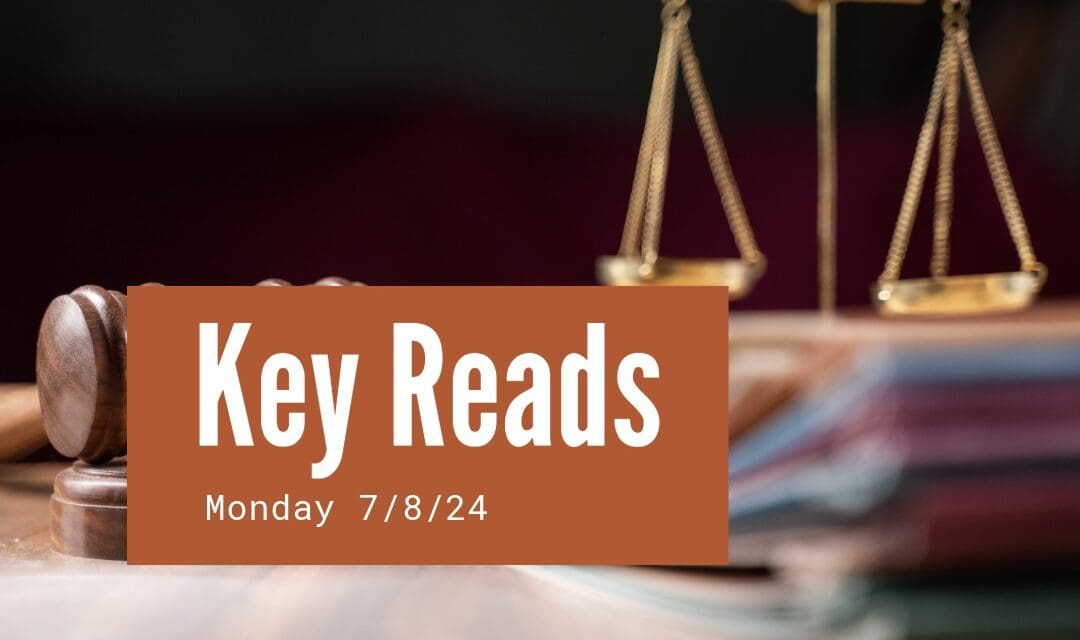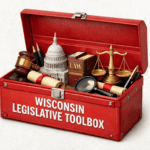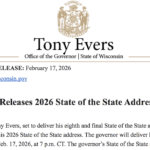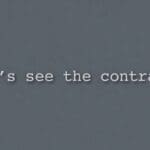The extended July 4th weekend provided a large window for the “news dump” that usually occurs on late Friday afternoons.
The embattled chancellor of the University of Wisconsin-Milwaukee announced he’s going to step down next year. We saw continued activism from the Wisconsin Supreme Court; and, not to be outdone, a Dane County Court has laid the groundwork for the partial dismantling of Act 10. That’s a move that will cost state and local governments and taxpayers billions of dollars.
Meanwhile, the heavy rains of late Spring/early Summer have left our farmers in a precarious spot, and a dam in Manawa faltered (but did not break), forcing families there to evacuate.
If you missed any of this, we’re envious. That means you had a nice weekend with family and friends!
To be fair, we also managed to fire up the grill a few times and shared in some fireworks of our own. But we gladly spent some time online, too — scouring the web in order to prepare today’s edition of our Key Reads.
The activist Wisconsin Supreme Court is facilitating a new method of collecting votes that, although tried before, does not appear in state statutes. While the ruling was expected, it is nonetheless egregious.
Absentee ballot drop boxes allowed in November election | The Center Square
Voters in Wisconsin will once again be able to drop their ballots in drop boxes in the November election.
In the state Supreme Court’s 4-3 ruling Friday, Justice Ann Walsh Bradley wrote in the majority opinion that while nothing in Wisconsin law specifically allows ballot drop boxes, the law does allow voters to leave their ballot with the local clerk’s office as opposed to the local clerk.
And, by way of that, the clerk has discretion to use drop boxes.
“By mandating that an absentee ballot be returned not to the ‘municipal clerk’s office,’ but ‘to the municipal clerk,’ the Legislature disclaimed the idea that the ballot must be delivered to a specific location and instead embraced delivery of an absentee ballot to a person,” Bradley wrote. “Given this, the question then becomes whether delivery to a drop box constitutes delivery ‘to the municipal clerk.”
The court struck down the use of ballot drop boxes following the 2020 presidential election. At the time, the bench was considered to lean conservative; today, it’s considered to lean liberal.
In the 2020 ruling, the court said nothing in Wisconsin law allows for the use of unattended ballot drop boxes. The justices said absentee ballot law “must be carefully regulated to prevent the potential for fraud or abuse.”
Bradley wrote, “A drop box is set up, maintained, secured, and emptied by the municipal clerk. This is the case even if the drop box is in a location other than the municipal clerk’s office. As analyzed, the statute does not specify a location to which a ballot must be returned and requires only that the ballot be delivered to a location the municipal clerk, within his or her discretion, designates.”
The dissenting opinion noted politics.
“The majority again forsakes the rule of law in an attempt to advance its political agenda,” Justice Rebecca Bradley wrote. “The majority began this term by tossing the legislative maps adopted by this court … for the sole purpose of facilitating ‘the redistribution of political power in the Wisconsin Legislature.’ The majority ends the term by loosening the Legislature’s regulations governing the privilege of absentee voting in the hopes of tipping the scales in future elections.”
Rebecca Bradley said the ballot drop box decision is lacking both case law and common sense.
“To reach this conclusion, the majority misrepresents the court’s decision in Teigen, replaces the only reasonable interpretation of the law with a highly implausible one, and tramples the doctrine of stare decisis,” she added.
The continued rains have impacted crops and now are threatening property and public safety. The week ahead could bring even further damage.
Cleanup underway in Manawa following flash flooding and dam breach | WLUK
While the dam didn’t break, erosion around it sent water rushing down the Little Wolf River. The flood waters that overwhelmed Manawa and clean up was underway.
The Saturday sunshine was a welcome scene in Manawa after flash flooding and a dam breach forced evacuations in town 24 hours earlier.
“It was an absolute white sheets that just stayed and there was no wind. And the water just kept going up and up,” said Mayor Mike Frazier.
In 1959 the legislature and Governor, through new state statutes, allowed some public employees to collectively bargain for some things. In 2011, a new law was passed that restricted some of those employees and limited some of the things eligible for collective bargaining.
That law, now commonly referred to as Act10, has saved local and state taxpayers tens of billions of dollars in the last dozen years.
Act 10 has been challenged numerous times, and each time the challenge has been shot down by a state or federal court. Given the new activist nature of the Wisconsin Supreme Court, however, this challenge poses a significant threat to the future of these public employee labor reforms. When you see or hear a politician praise this ruling in the news, see if the reporter asks them how they plan on paying for the pending explosion in the cost of government in Wisconsin that would accompany the dismantling of Act 10.
Dane Co. judge rules parts of Wisconsin Act 10 regarding public unions ‘unconstitutional’ | CBS58
Act 10 has survived several legal battles over the years. The bill that was signed by then Gov. Walker in 2011, eliminated collective bargaining for most public workers.
It created two classes of public employees: ‘public safety’ and ‘general employees.’ Under Act 10, workers like police or fire fighters were classified as ‘public safety employees’ and had their collective bargaining rights largely unchanged, while all other non-specified public workers, categorized as ‘general employees,’ were limited.
Unions that represent public employees filed the lawsuit In November 2023.
In his 25-page decision, Judge Jacob Frost stated that, “nobody could provide this Court an explanation that reasonably showed why municipal police and fire and State Troopers are considered public safety employees, but Capitol Police, UW Police and conservation wardens, who have the same authority and do the same work, are not.”
Therefore, Judge Frost decided to rule that part of the act unconstitutional.
His settlement with the pro-Hamas trespassers was not well received. Now, UWM’s chancellor is bowing out.
Mone Watch: UWM Chancellor Mark Mone to Quit | Dairyland Sentinel
Less than two months after letting pro-Hamas protesters disrupt campus life and harass Jewish students, UWM Chancellor Mark Mone has announced his intentions to step down, in a year.
Last week, he posted this message on the UWM website.
Chancellor Mark Mone shared the following message to UWM students, faculty, staff, alumni and community members on July 3, 2024.
I write to share that, after careful thought and discussion with my family and close colleagues, I have decided to step down from my role as chancellor and return to my professorship with the Lubar College of Business effective July 1, 2025. This timing allows for a smooth transition to a new leader.
Being your chancellor is as rewarding as it is challenging, and it’s a role that requires round-the-clock attention. At the end of our next academic year, I will have been chancellor for 11 years – twice the average tenure of college presidents today and longer than any of UWM’s chancellors, with the exception of our founding chancellor, J. Martin Klotsche. With our momentum on many fronts, now is the right time.
…It will be no surprise that I am committed to finishing strong. We are launching new partnerships with area technical colleges, Microsoft, Titletown Tech and others. We’re advancing a philanthropic focused initiative with an emphasis on student success, and have made great progress on the construction of the new research vessel, Maggi Sue. We’re strengthening community relationships and preparing our campus for a vibrant future. We will continue our path of fiscal management and prepare the campus for my successor.
I deeply appreciate the tremendous support you have provided in good times and throughout the challenges. I highly value how much you care, which is a hallmark of the spirit of UWM. Thank you for the privilege of serving as chancellor of this important institution.
Best regards,
Mark A. Mone, PhD
After the pro-Hamas encampment debacle, wherein he traded peace on campus for a statement of political support for the demands of the protesters, Mone was the subject of harsh criticism from students, alumni and Milwaukee’s Jewish Community.
University of Wisconsin-Milwaukee (UWM) Chancellor Mark Mone capitulated to protesters who violated UWM codes of conduct and state law, vandalized university property, and used harassment and intimidation to fuel antisemitism on campus. The agreement is among the most offensive and dangerous of any university agreement reached with encampment protesters over the last two weeks.
— Hillel Milwaukee, the Milwaukee Jewish Federation, and ADL (the Anti-Defamation League) Midwest Statement 5.14.24He attempted to calm the waters by issuing an apology in late May.
It read, in part:
It is clear to me that UWM should not have weighed in on deeply complex geopolitical and historical issues. And for that, I apologize. I acknowledge that it is an increasingly difficult time for many Jewish students at UWM and across America. I’ve also heard that some students have not felt comfortable reporting their concerns or experiences. This distresses me. The expressions of grief and frustration over the conflict in the Middle East must not destabilize our shared sense of humanity or be twisted into a platform to spread hatred.
Let me be clear: UWM resolutely condemns antisemitism, just as we do Islamophobia and all other forms of hatred. Our campus must be a place that welcomes all students and the full expression of their history, culture, identity and ethnicity. But words alone cannot create the culture of inclusion we desire, which is why we must transform our words into commitment and action. This work will take time, as all hard work does, and it will also take the openness of our entire community.
As we move forward, I am dedicated to continued listening, conversation and engagement with all our students. I recognize that students must first trust that we can better support them before they can feel comfortable sharing their concerns.
Apparently, the apology was not well received.
While other outlets will focus on the horse-race aspect of the ongoing political campaigns, we’re going to continue to dig into the issues, like the future of Act 10, the search for a new UWM chancellor, the brewing scandals at MPS and the state prison system, etc. We’re gearing up to provide you greater access to the information you need to stay informed. The main website will continue to roll out new features, but our pledge to your remains the same. This Key Reads update is aimed to give you enough to stay up to speed, without overwhelming you with links and data.
Also, while politicians and politics are worthy of our attention, they will never be our sole focus. We love Wisconsin, and we highlight the people, places and customs that make it great. We also keep you posted regarding those people and ideas that run counter to Wisconsin’s spirit of community, family, tradition, fun, hard work, thriftiness and honesty.
We’ll be back at it again tomorrow.


















